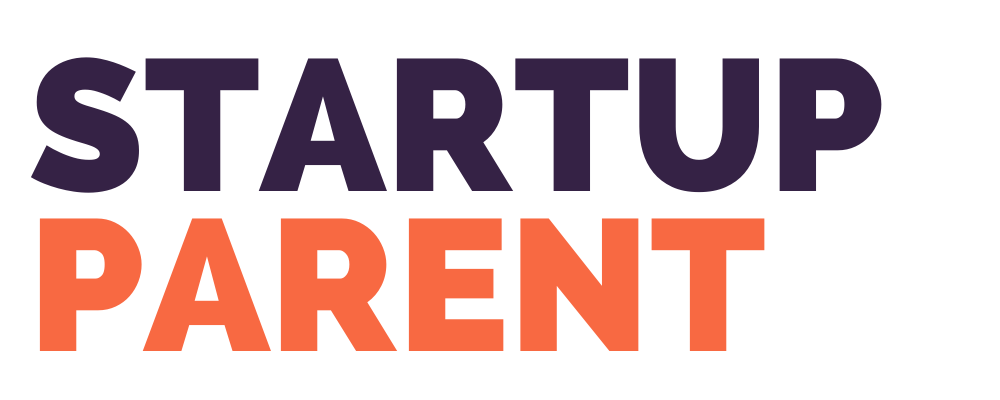“Grieving An Avalanche of Emotions” A Professional Ice Climber Shares How Motherhood Irrevocably Changed Her Career — Episode #212 with Majka Burhardt
Becoming a parent is a transformative experience. It also comes with a lot of emotions to process.
When professional climber and founder Majka Burhardt discovered she was pregnant, she decided to record audio journals to her future child. It was a way of processing her emotions and worries. What Majka didn’t realize at the time was that these recordings would eventually turn into a book about the emotional journey of motherhood.
There wasn’t enough room for nuance in the conversations about parenting, and Majka needed that space.
As someone who was used to having an agenda, Majka was surprised to find out she was expecting twins. This unexpected change created an avalanche of emotions, and asked her to throw preconceived notions about pregnancy, parenting, and work out the window.
As an athlete and social entrepreneur, the choice to become a mother wasn’t easy for Majka. She was flying around the world, scaling terrain nearly untouched by humans, all while building a global nonprofit. By her late thirties, she wasn’t sure if becoming a mom was in the cards. But then she suffered a toe injury which paused her climbing career and changed her mind.
Having kids changes how you show up in relationships and roles.
For Majka, becoming a parent helped her access her humanness and extend humanity as a leader. Bringing all of her self to work — including the inconvenient realities of parenting —created space for her team to show up fully as well.
Letting go of control and developing emotional literacy wasn’t easy for Majka. In this episode, she talks about how that’s what parenting demands of us, and the growth her family and team went through.
In this podcast, Sarah K Peck and Majka Burhardt cover:
- What inspired Majka to write her book More: Life on the Edge of Adventure and Motherhood, about her own emotional journey becoming a parent.
- The importance of having conversations about the hard parts of parenting, and create safe spaces to talk about the challenges — especially our nuanced, specific feelings in the moment.
- The challenges of learning emotional literacy while parenting young children, and how our kids highlight our needs for growth.
- The considerations Majka faced when deciding whether or not to become a mom while at the peak of her career in a male-dominated industry.
Listen to Episode #212 of the Startup Parent Podcast to learn more about Majka’s motherhood journey, her experience building Legado, and the number one piece of advice that Majka has for entrepreneurs and founders who are building a business while growing a family.
Listen to The Startup Parent Podcast on Apple ★ Spotify ★ Overcast ★ Castbox or wherever you listen to podcasts. Find another podcast player or the RSS feed here.
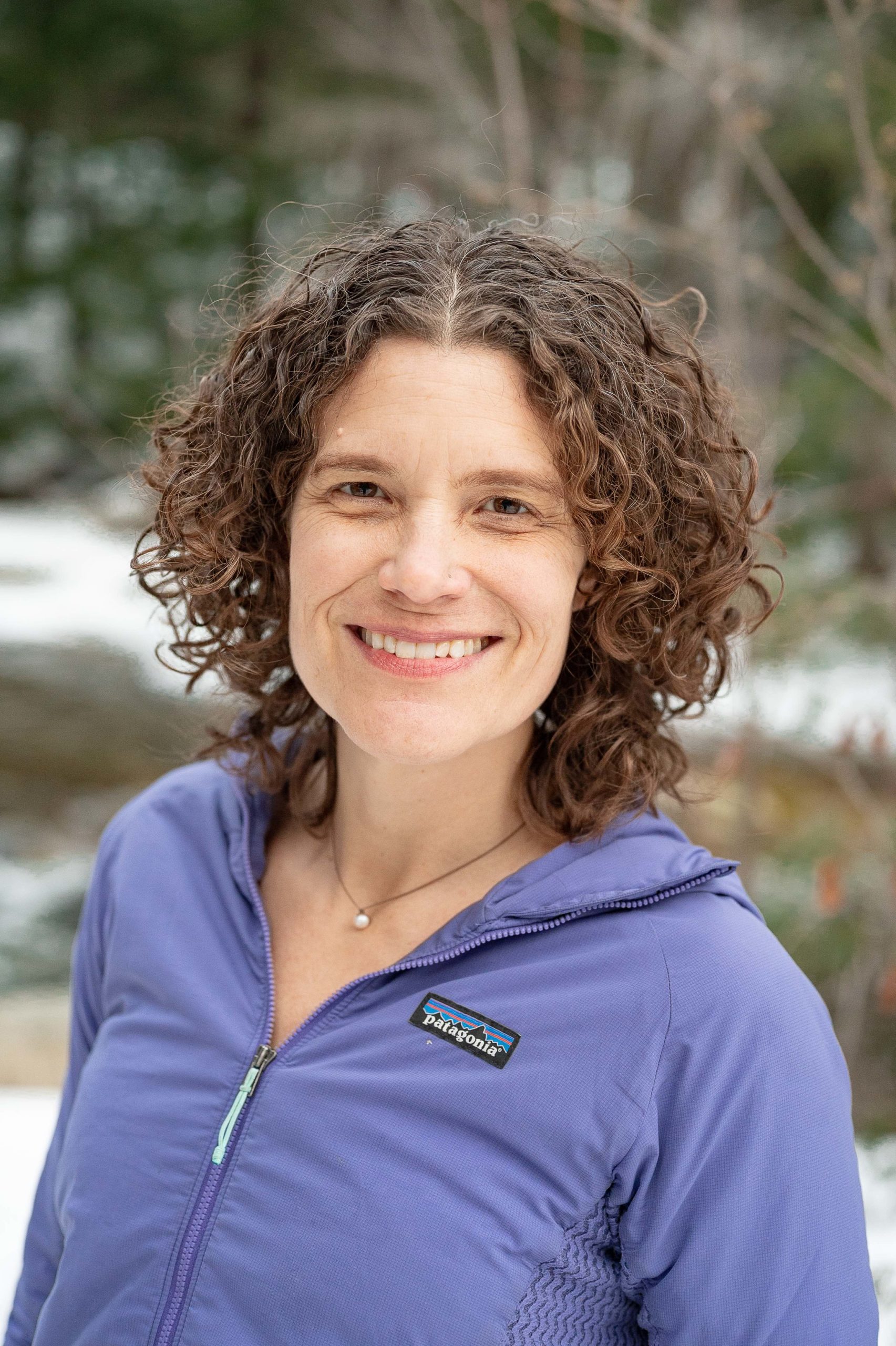
FEATURED GUEST
Majka Burhardt, Author, Founder, Professional Climber
Majka Burhardt is a professional climber, social entrepreneur, author, mother of twins, and filmmaker.
She is also the Founder and Executive Director of Legado, a women-led, global nonprofit that works alongside indigenous peoples and local communities (IPLCs) in places important for biodiversity (Kenya, Mozambique, Peru, and growing) to ensure they have the tools, resources, and partnerships they need to design and implement solutions of their choosing that benefit both their communities and landscapes — an outcome they call Thriving Futures.
EPISODE SUMMARY
In this episode, Sarah and Majka discuss:
- The range and nuance of emotions in motherhood. Majka shares that she was ping ponging around a million different emotions, but the only narratives available were to be ecstatic about motherhood or having a mental health breakdown. There wasn’t room to discuss the hard parts of parenting in an impermanent way, or support in processing the big feelings.
- The importance of bearing witness to the hard moments. One of the hardest parts of being with big emotions and feelings is when you think you’re alone in them, because that’s when shame takes hold. Majka talks about the value of getting grounded in those moments, and having people you can connect with — even if it’s just for five minutes.
- The work of learning emotional literacy. Sarah and Majka dig into the challenges of holding space for their own big emotions while helping their kids learn how to navigate their own. They talk about the way that our children’s emotional development can be catalysts to our own growth opportunities, and how hard that is in practice… because it is messy.
- The reality check about control that pregnancy and parenting deliver. When Majka found out that she was pregnant with twins, she had to set aside any preconceived notions she had about what motherhood would look like. She learned that there’s no way of knowing what you’re signing up for when you have children, because you don’t know the needs that your kid will have until they’re here.
- Navigating the tension of growing a family and your career. Majka hadn’t always imagined herself as a mother and struggled with the choice for years. A social entrepreneur and professional climber at the peak of her career, she wasn’t sure her way of life fit with having a family. Once she committed to the path of parenting, Majka had a whole new host of choices to face, and they didn’t get easier.
- How becoming a mother changed the way that Majka leads her company. Majka was already an emotional leader, but after having kids she was able to bring even more humanity and humility to her leadership approach as a result. She shared the way that integrating the roles of “leader” and “mother” helped her to connect with her people, and show up with more authenticity.
- Managing your mental wellness and setting boundaries as a founder. The ability to set (and stick to) hard boundaries is difficult when you’re a founder, because you are ultimately responsible to make the decisions that keep your organization afloat. That said, it’s imperative that you are able to manage your health and well-being so that you have the capacity to make those necessary choices.
Links and resources mentioned:
“That was this thing I was reckoning with, because it wasn’t just that I had to work. It’s that I wanted to work. And it’s that combination — that’s part of the insatiability. I don’t want to just clock in clock out, I want to drive this thing. I want to try new things. I want to make it better, stronger, more impactful. I want to be challenged in this. And I want to be a mom. So how the heck do I do this?”
— Majka Burhardt
CONVERSATION HIGHLIGHTS
Key ideas & supporting quotes from the conversation
Becoming a mother isn’t a clear-cut choice for everyone; it’s complicated.
“Being the only girl and being good at it was a source of pride for me from a very young age. And very early on when I translated that into being, wanting to be a professional climber, if I would, I never talked about wanting to be a mom, I never thought about it after that point, because that was becoming feminine. Right? Like, it’s like owning your identity as a woman in a way that felt like it would diminish my identity as an athlete. And I didn’t understand that until recently, like, I would not have been able to articulate that 25 years ago. Right? But now I’m like, oh, yeah, when I was like, kind of like cutting through being in a very small minority of women in the, in the elite climbing community, it did not feel – like I would go backwards if I talked about like, Well, yeah, I want to be a mom. Thankfully, that’s not happening now.” (MB)
“I remember going places and seeing kiddos and just being like, I don’t even want to have anything to do with them because then people are gonna think that I’m one of those mothering types, right? Like, and suddenly you know, it’s like, I’m not a mothering type, I have an agenda over here, I’ll deal with whether or I’m not really a mothering type later” (MB)
“For me, there was not this longing. But you know, what happened is if I had kiddos, and I had friends’ kids, and I would like carry them around, and I get a glimpse, I’m going to cry telling you this, and I get a glimpse of myself in the mirror with a kid, I would look at it. And I’d be like, is this me? Do I need to do this? Should this be like, like, what does this look like? What does this feel like? And I can remember that and like, bathroom mirrors with my friend, Sarah’s son, Mason, and just being like, Oh, there you are. Do you want this? And like not really knowing what to do about that.” (MB)
It’s hard to negotiate parenting roles fairly because you don’t know what’s coming down the pike.
“You enter into this agreement with someone else, this idea, but it’s this vast unknown. It’s like, Let’s go explore.” (SKP)
“Children are pretty much fire breathing dragons, the kids – I think you picked that part aptly. Like, who should, who should be where, when? And what are those kids? Right? Like, do you have kids who have different needs than you would have thought about in your sort of frictionless planning world? Or did you not plan, right? But suddenly, you just assumed roles without having dialogue about them.” (MB)
“You’re literally the one carrying the children. And I think that that skews some of these, like gendered roles in it. Like, even if you might have been more certain that you wanted to try it, you know, you can change the rules at any time. Why can’t we change the rules at any time? Because we had no idea what we were getting into. You have no idea what you’re getting into when your kid you know, like, becomes seven and like they have their whole host of things or they go through puberty. It’s like no, I’m sorry, that thing that we agreed to no longer stands. Not in like a bad you suck way. But like, hey, timeout, we’re partners, let’s reevaluate what’s going on.” (MB)
Parenting can be an incredibly lonely experience, even when you’re in active partnership with someone.
“I talked about in the book quite a bit about how lonely it is to be a parent when you’re partnered, which is such a wild thing to say, because in theory, you’re sharing this thing, but what you’re actually- you’re, you’re you’re each in your own experience without a lot of connection points between the two of you, because you’re tired, because you’re maxed out. But you’re also not able to, like change the terms. And I think that that can make it feel really, really lonely and really, really isolating, even if every night you’re going to bed next to the same person.” (MB)
“You’re sharing a space of unconsciousness, but you’re ships passing in the night too, right? It’s like, Did you buy the diaper cream from Amazon? Or whatever? The, you know, these are not the stimulating conversations or adventures you’d had years prior.” (SKP)
“The 360 degrees of emotions that I was having, and it was like, Where do I put this, and who’s willing to talk to me about this? Right? Because Can I have that with my spouse? No, like, we can’t seem to talk about anything, because we only have 10 minutes to talk. And, you know, we need to talk about other things, because they’re higher priorities.” (MB)
“We’re not giving other parents enough grace, and it’s as if you admit that something is hard, then it’s no longer great. But it’s not a binary; both of those things can sit in the place at the same time.”
— Majka Burhardt
Having safe spaces for our feelings helps us to navigate the ups and downs.
“And it’s okay, if it’s, if it’s like, a really big, strange, difficult, weird, unusual feeling, we’ll be there with you in that. And we’re not going to leap to conclusions about the fact that this is how you feel all the time. Right? It’s okay to absolutely loathe parenting sometimes it’s okay to not like being pregnant. It’s okay to resent your partner. It’s okay to be frustrated at your kids, right? And the underbelly of this is like, it’s okay to be a human being with feelings.” (MB)
“I’m regulating and processing my emotions, I am meeting the six year old where they are because their prefrontal cortex is not even developed, I need to throw this dirt on the ground without dropping my child, I need to pull my pants up, right? Like, something needs to happen. And yeah, that’s when you text a friend. And you’re just like, I need five minutes to just metaphorically or actually scream.” (SKP)
“[We need] someone to hold the witness to that the absurdity of all those things going together. And I think that ties back to the loneliness because you’re like, holy cow, is anybody else going through this? And if we all are doing it, this is batshit crazy.” (MB)
Learning how to feel and process your emotions is hard and messy, no matter how old you are.
“And if you don’t learn how to do it. It’s not pretty when you start doing it. It’s icky, and all these things right? Like you, I mean, and that was for me, such a big part of it because you know, I had these two, two and a half year old with all this red, hot emotion and suddenly realizing that I didn’t know how to handle those emotions, but yet I was supposed to be the leader and teaching them how to do this and I’m like, Well, this is a not a great, like, Who’s in charge here. And, and what I had to do is just get really honest with my kiddos and say, I’m learning with you.” (MB)
“You’re gonna have to stumble your way through this, you’re gonna have to stumble your way through this with almost like three, two and a half year olds — yourself and your twins, managing your way through this and you want to make that step, right. Like, hello, now you’re triplets.” (MB)
“When you reach a friction point, there’s something in you that’s learning and growing, and you’re like, Oh, I’m three in this area of my life, or I’m seven. Like, I haven’t learned this yet, and now I’m learning alongside you and look at us mucking through this.” (SKP)
We aren’t meant to navigate the big feelings on our own.
“And the moments when they happen, they might not be the your be all end all feeling for four years, but the moment it comes in, it’s very real.” (MB)
“I feel like I’m ping ponging around in a million different emotions, but the only narratives available to me are to either be completely jazzed on this or to be in postpartum depression. Like, where is the other narrative? And how do we be brave enough and create the spaces for ourselves and our friends to have that? Because you have the biggest highs and the biggest lows, and not because you’re, you know, imbalanced, because I think that’s actually what we’re all going through. We’re just really bad at talking about it.” (MB)
“You need to just say like, this is too much for me to hold by myself. And I need someone else to tell me that I’ve got this and I’m okay. Not because we’re about to go off the cliff but because that is life. Right? Like there’s nothing wrong with you. If you feel like that. It means that you are actually owning your humaneness.” (MB)
“It’s having the space and the grace to be able [to say to someone at work], I do have to deal with this one thing, and that happens to be right in the middle of our call.”
— Sarah K Peck
Having high pressure constraints can force clarity.
“I looked back on it, I think it was insane. But it also like, it also pushed me to really see that I cared about this work. Because if I didn’t care so much about it, I would have found a way to stop doing it and instead kept doubling down and being like, this is how to do it. This is how to do it better.” (MB)
“That was this thing for me that I was reckoning with, because it wasn’t just that I had to work. It’s that I wanted to work, right? And it’s like that combination, that’s part of the insatiability. It’s like, oh, I don’t want to just clock in clock out, I want to drive this thing. I want to try new things. I want to make it better, stronger, more impactful. I want to, I want to be challenged in this. And I want to be a mom. So how the heck do I do this?” (MB)
Also, parenting is super sweaty!
“Emotionally you’re about to go off the cliff like you’re just you’re spicy, you’re hot, you’re whatever it is like, I know those moments. So I’m feeling shivers right now because there’s just those moments that happen in parenting when you’re totally overwhelmed. You know, I was lugging bag of garden soil in from the car and like it was falling.” (SKP)
“And then my kid was like, carry me, you know, and he’s 50 pounds, this garden soil is 30 pounds, and then I’m like sweating and I didn’t put a belt on. And so my jeans are slipping down. And it’s 86 degrees in New York and like, everything’s not working then my glasses are falling off my face. So I can’t read. And it’s just a little moment when like the six and a half year old is like, ‘Mom, I didn’t like it when you…’ and you’re like, you’re just like I am. I am. Right. And then then on top of that, you’re exerting the energy to be like,”
“Alright, I’m regulating and processing my emotions, I am meeting the six year old where they are because their prefrontal cortex is not even developed, I need to throw this dirt on the ground without dropping my child, I need to pull my pants up, right? Like, something needs to happen. And yeah, that’s when you text a friend. And you’re just like, I need five minutes to just metaphorically or actually scream.” (SKP)
SHORT QUOTES FROM THE EPISODE
Short quotes & notes from conversation
Majka Burhardt: “But I’m of the mindset where I’m like, if I just try hard enough, I can probably make this work for me in this way. And like, by the universe giving me two babies at once, it’s like, No, you’re going to have to like, let that be your leader, not – you don’t get to be in charge here.”
Majka Burhardt: “I eventually became more clear because of hurting my toe while climbing in Chamonix… I was like, I’m going all in for climbing, I’m not gonna have kids. And then I had this stupid toe injury. And I thought, really, this is the thing you’re gonna be all in for, that a toe injury can make you not have and that’s what you’re giving up motherhood for? Like, really? Just hold on Majka, like this makes no sense.”
Sarah K Peck: “It’s that heart, the heart at the center. And, and really being like, am I still going in the direction I want to go? Does this still matter? Is it so still deeply rooted? And if we veered off course, like, do I still have the choice? The ability to come back to what it is that drives me?”
“I’m of the mindset where I’m like, if I just try hard enough, I can probably make this work for me in this way. But by the universe giving me two babies at once, it was like, No, you’re going to have to let that be your leader, you don’t get to be in charge here.”
— Majka Burhardt
GRAPHICS
If it resonates, share this episode and feel free to share these graphics.
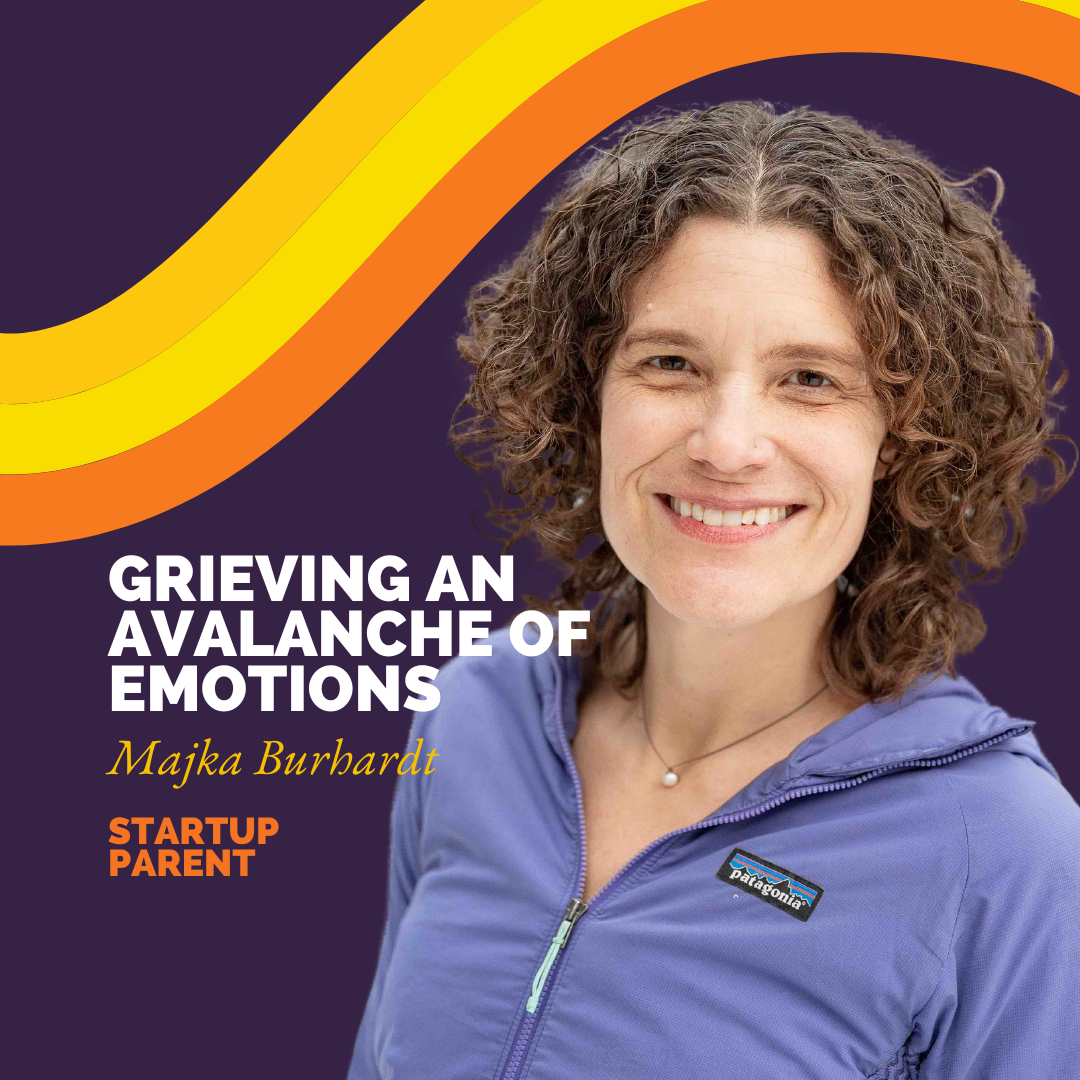
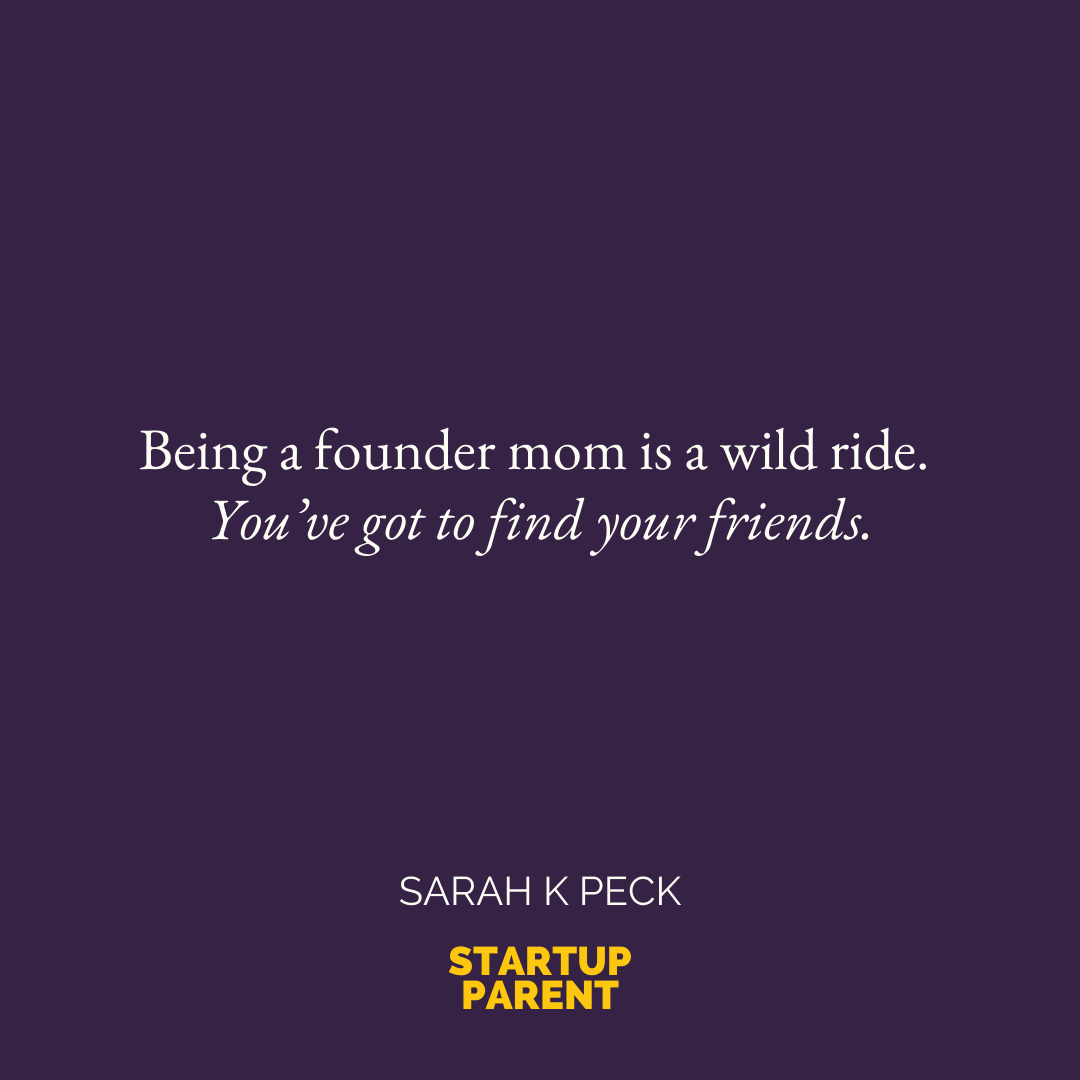
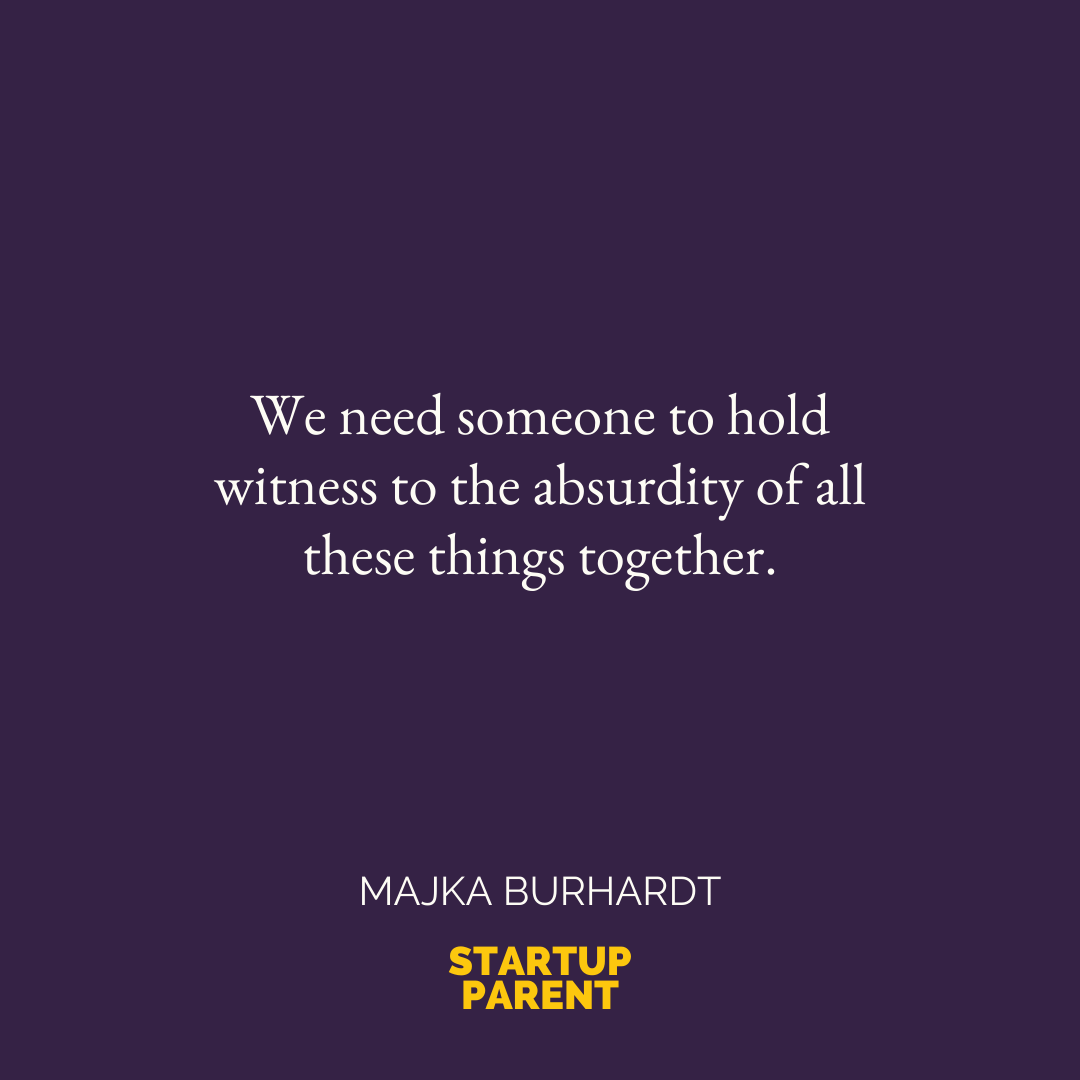
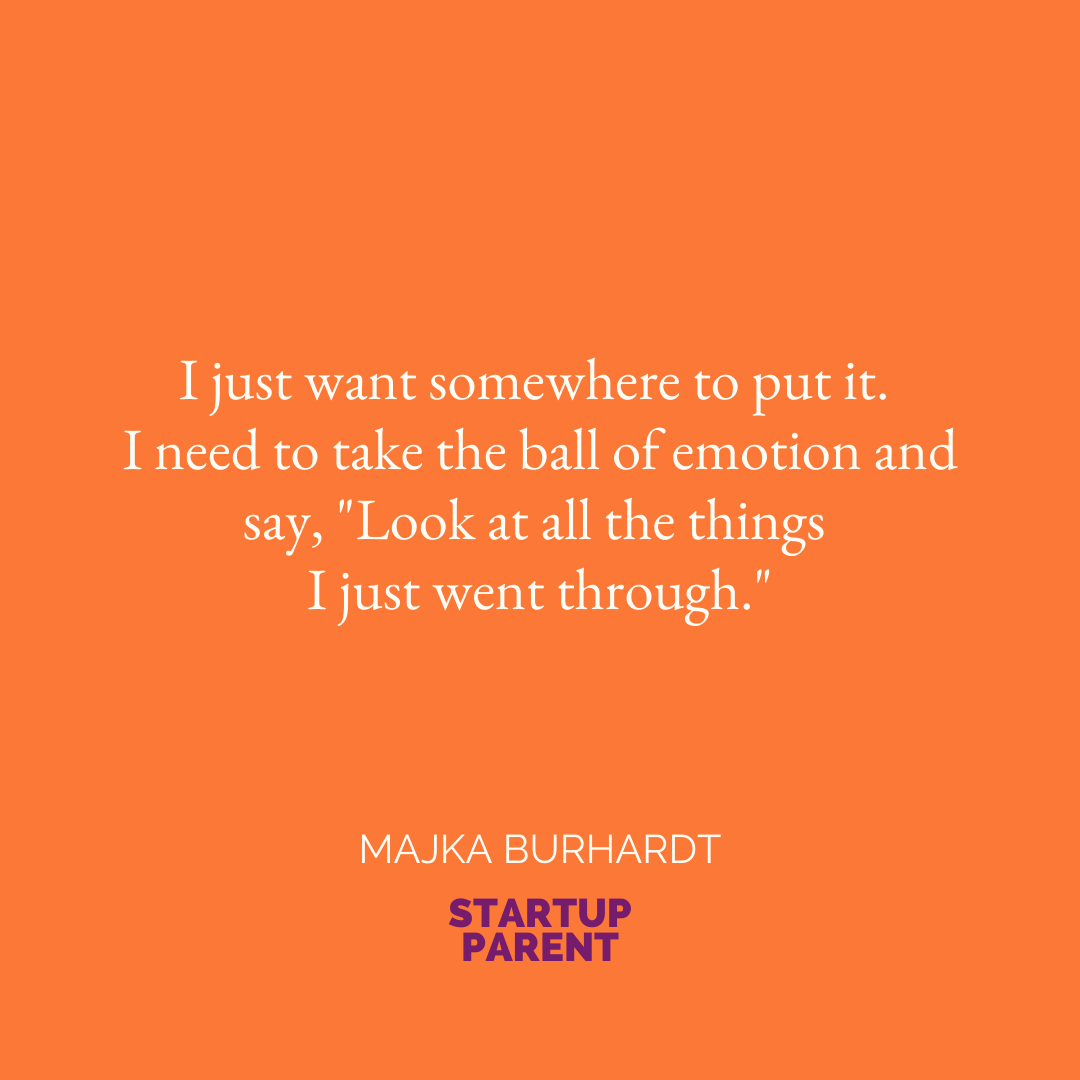
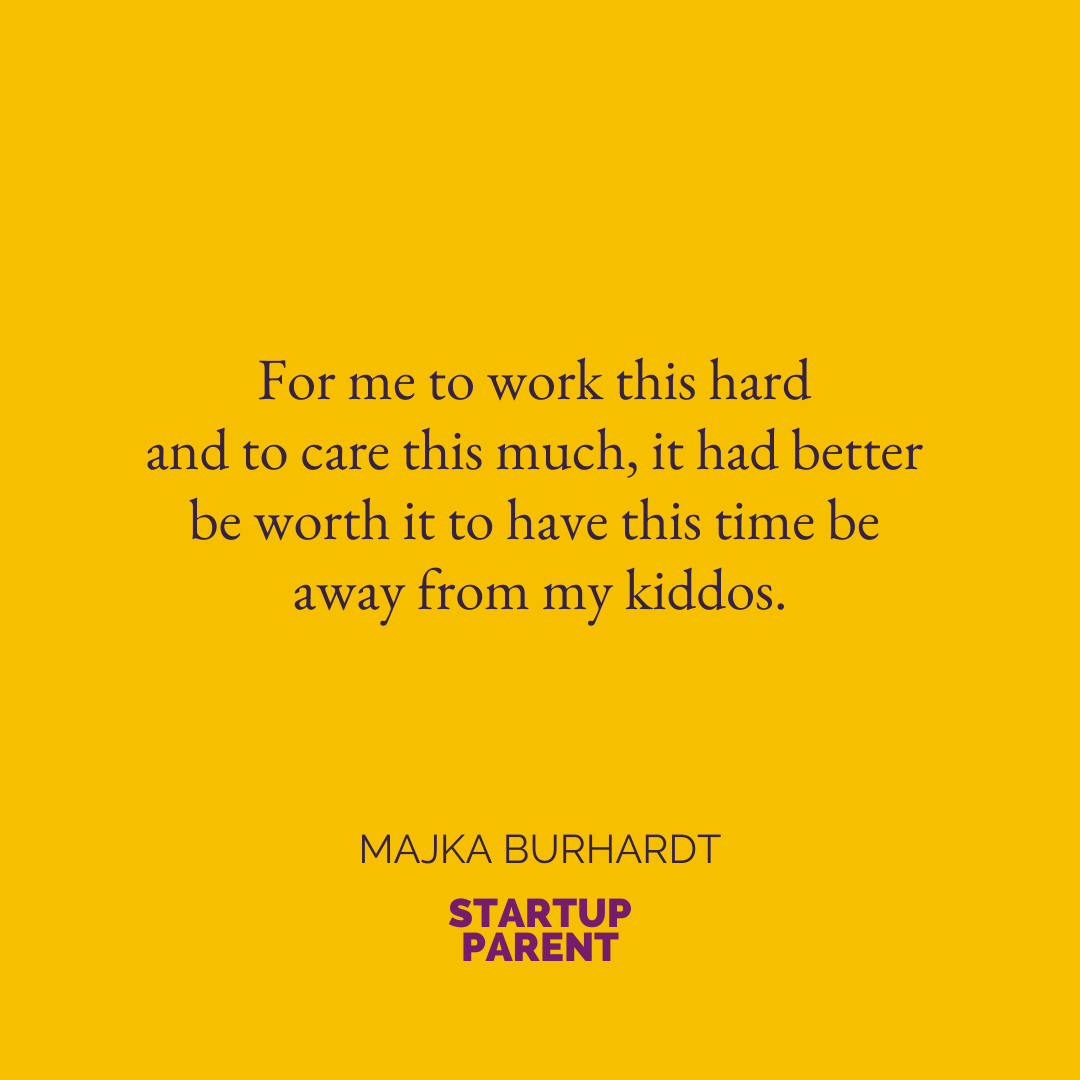
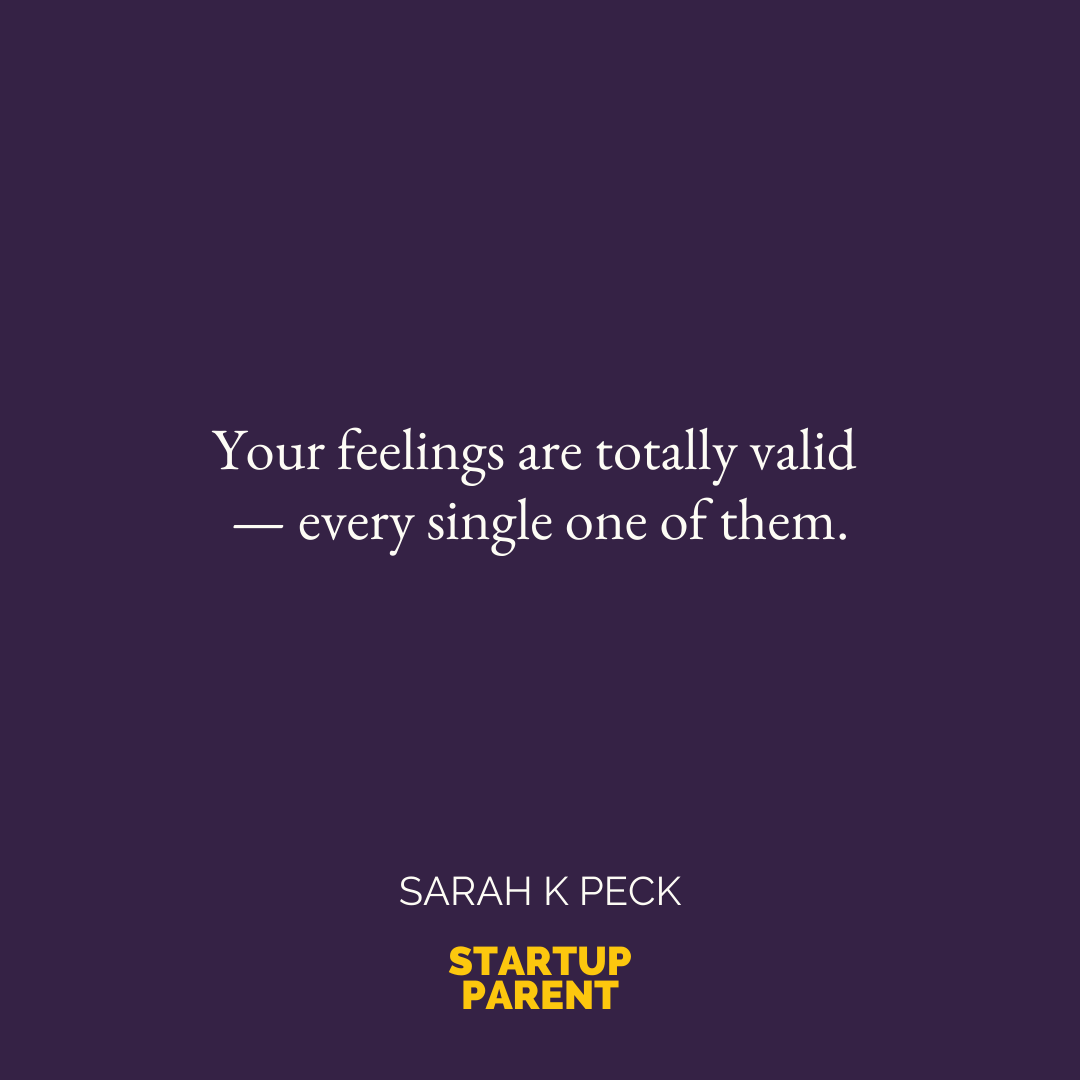
Listen to The Startup Parent Podcast on Apple ★ Spotify ★ Overcast ★ Castbox or wherever you listen to podcasts. Find another podcast player or the RSS feed here.
ABOUT THE STARTUP PARENT PODCAST
If you're growing a business, leading a team, or figuring out entrepreneurship and you have kids, this podcast is for you. We go in-depth with founders and entrepreneurial parents about what it really takes to have babies, grow businesses, and get a little bit of sleep. Sign up for the newsletter to get new episodes in your inbox. And leave us a review on iTunes.
Listen to The Startup Parent Podcast on Apple ★ Spotify ★ Overcast ★ Stitcher ★ Castbox or wherever you listen to podcasts. Find another podcast player or the RSS feed here.
